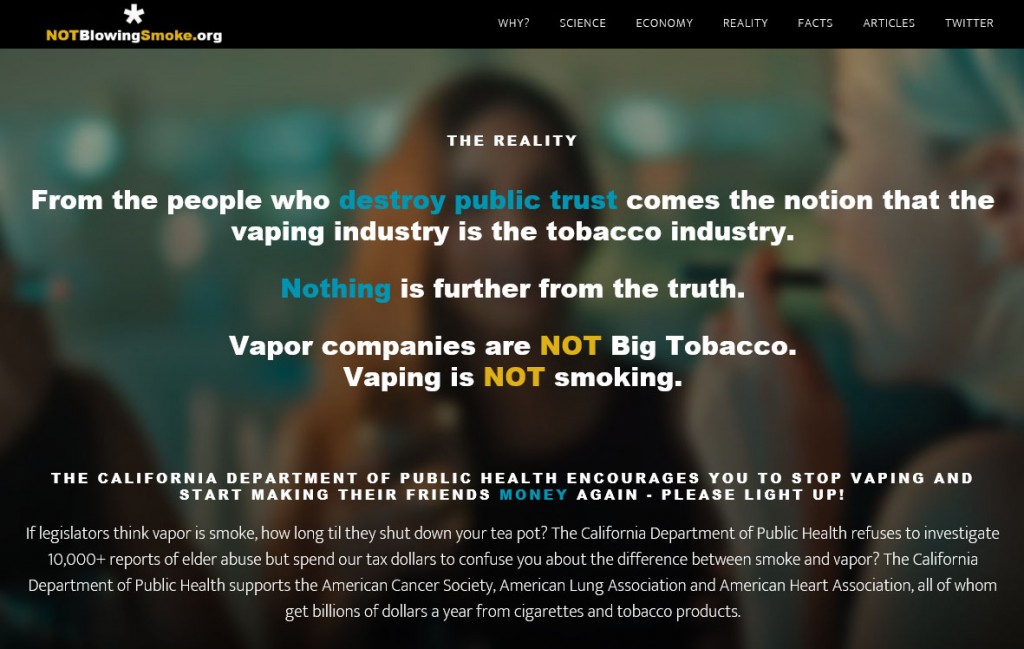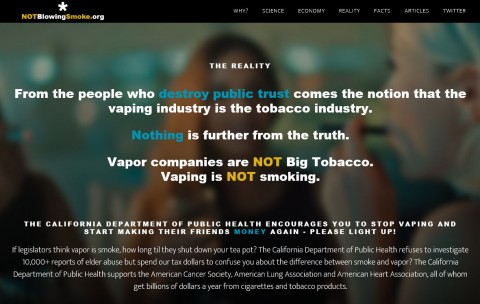Who is “Big Vaping”: a small slice of the e-cigarette misinformation war
Earlier today, Vox put out an article titled “How Big Vaping is misinforming the public about e-cigarettes“. In it, the author attempts to paint the growing grassroots vaping movement with the same brush as Big Tobacco. Unlike most online news sources, Vox doesn’t have a comment section directly below their articles, so I’m posting this here. The quotes are from the original article.
It’s also Saturday morning, and I haven’t had my coffee yet…
While the state campaign reminds its citizens that all the Big Tobacco companies also own e-cigarette companies, the vaping site pushes the narrative that “vaping is small business, not Big Tobacco.”
Right off the top: As a reporter, shouldn’t you see which one is telling the truth? When you spend more time analyzing the tactics of the “info war”, you can forget the big picture. In this case, vaping IS small businesses, thousands of them. Big Tobacco companies have invested in the “cig-a-like” style vapes (Blu, Mark Ten, and Vuse), which are actually losing ground compared to the more advanced vapes available. You can find a link to how their a minority player in the business buried on an obscure website called Wikipedia.
While California suggests there’s still a lot we don’t know about the health impact of e-cigarettes, the vapers are a lot more certain: “Long-term e-Cigarette use can decrease cigarette consumption in smokers not willing to quit,” their site reads. “E-cigarettes are less addictive than tobacco cigarettes.”
As vaping has been around for a decade, and the number of users increases, there is a lot more we know than we did just two years ago. Not Blowing Smoke, and it’s groups, have links to the research. Actually reading it, and understanding it, is a better move than to treat each sides points as equally valid.
For public health workers, the quick counterattack is reminiscent of early fights over cigarettes. Cigarette companies, for decades, knew their products were harmful. But they denied those hazards, hiring prominent researchers and lobbyists to wage public-awareness campaigns unpicking and calling into question the mounting evidence about links between smoking and cancer, heart disease, and early death. Big Tobacco managed to divert the conversation about health and turn it into one about politics and governance.
This is totally irrelevant to the real point, unless your goal is to create a false relationship between Big Tobacco and your so-called “Big Vaping”. The quick counterattack is because people are passionate about vaping. I would argue that part of the reason some many vapers are outspoken is precisely because it got them OFF the teat of Big Tobacco. If there’s any doubt, then I should point out that many studies have actually shown that vaping is twice as effect as any other smoking cessation tool.
E-cigarettes are much newer, their health impact is still unclear, and the research may eventually show that pro-vapers are correct and they are a helpful harm-reduction tool. But even if the science follows a different trajectory, the situation in California and elsewhere suggests the Big Tobacco marketing playbook is being rolled out once again.
This is the kind of playbook that ANY advocacy group would use, in the face of a multimillion dollar misinformation campaign. Why would you expect any other response? By comparing vaping advocacy to Big Tobacco efforts, you’re wrongly painting them as associated with them, unless you can explain your headline… who is Big Vaping?
While the e-cigarette market is growing fast in the US and around the world, particularly among adolescents, just about every national and international health group agrees the jury is still out on the health impact of these devices.
Good old “Won’t somebody think of the children?” angle. That always plays well in the sticks. Again, you’d find actual links on the Not Blowing Smoke site, as well as ecigarette-research.org, but vaping is not encouraging kids to smoke.
The World Health Organization has called e-cigarettes safety “illusive,” since the ingredients they contain are not always disclosed and there is not “adequate data on emissions.” The Centers for Disease Control takes a similar stance: that there is not enough evidence to understand the health impact of vaping. They warn of the potential for nicotine addiction and poisoning, and believe the devices should be more tightly regulated. Like many other research groups, both the CDC and WHO are concerned about the still-unknown long-term biological effects. What’s more, when it comes to helping people quit smoking, the science is mixed at best.
Just because the WHO used the term “illusive” doesn’t make it right. There is also more than adequate data on emissions. As for helping people quit smoking, the science is not mixed at all. Vaping, as a smoking cessation tool, is far more effective as the next best tool. I’m not a journalist though, and shouldn’t have to do your research for you. The above links should take you to the information you’re looking for.
Because of this uncertainty, the public health community is warning people to proceed with caution.
But when researchers, anti-tobacco advocates, or public heath officials voice their concerns, they say they are met with a combination of doubt, vitriol, and trolling.
Researchers are often confronted with doubt because over the past few years, a number of those researchers have put out studies saying that there were toxic chemicals in vapor. In those studies, it was actually pointed out TO the researchers that they were actually BURNING both the liquid and the wicking material, which produces toxic chemicals, like what happens when you burn anything. In most cases, when this is pointed out to them, they have acquiesced, because they’re rational human beings.
Anti-tobacco advocates are usually driven by emotion, and as such, make bone-headed moves, making false comparisons between vaping and smoking.
Public health officials, to date, have often based their policy on poorly run research.
Should people NOT be called out when their study methodology is wrong, or when they’re misinforming the public?
As for trolling, it’s irrelevant, because every subject that people are passionate about brings out trollish responses. I’ll skip that whole section of your article because of its irrelevancy to the larger subject.
In Michigan, the chief medical officer, Dr. Matthew Davis, came under intense scrutiny when he testified about changing the way e-cigarettes were regulated in his state. The industry was promoting the idea that e-cigarettes are not tobacco products and should not be regulated as such.
Well, the “industry” and the users, and they’re right. Vaporizers do not contain tobacco, and shouldn’t be regulated as such. As for nicotine, on a “per dose” basis, they actually deliver far less than nicotine lozenges or inhalers made by Big Pharma.
“What people forget is that a lot of e-cigarette companies are connected to Big Tobacco,” Davis said.
ME: Now, I know you put this quote at the end of your article to try and reinforce the misleading title, but instead of taking a nebulous “a lot of e-cigarette companies”, why not take the time to actually inform your readers?
“What that means for the public health community is that proponents of e-cigs have very strong backing and very effective message generation honed over many years in the tobacco industry. This is a familiar adversary of public health, but the topic is slightly different.”
Big Tobacco has invested in companies that make “cig-a-like” e-cigarettes. The ones that look like regular cigarettes. There are literally thousands of vaping companies, big and small, which make up the vaping industry. I’d also argue that they make up the fastest growing part of the vaping industry, because anyone who tries a cig-a-like, and then a more advanced rig, sees a world of difference.
Ultimately, you’re trying to paint a true grassroots movement – vapers who managed to get away from Big Tobacco’s grasp – as nothing more than agents of “Big Vaping”, then trying to hint that this shadowy group might actually be the same people as Big Tobacco.
So, who is “Big Vaping”, beyond a boogeyman of your own creation?
CORRECTION: the article originally included NJOY as owned by a tobacco company. This has been removed.






Well said. Thanks for putting some reality into the discussion of this issue.
“But when researchers, anti-tobacco advocates, or public heath officials
voice their concerns, they say they are met with a combination of doubt,
vitriol, and trolling.”
Do they use an alternate definition of a troll – someone who points out the errors, misrepresentations and/or outright lies?
Branding all the individual voices as Big Vapor ( quite a mythical creation that) rather than grass roots, it is a way to dismiss their message. Ignore that man behind the curtain..
Thank you for this. I couldn’t have been so kind if I read this before my 1st cup of coffee!
Public health overlooks, belittles and disregards the public it claims to be concerned about